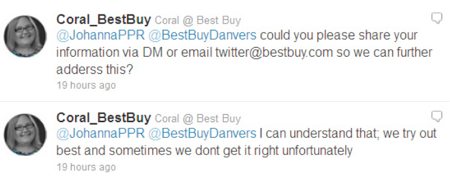PR – A Great Thing, but Not a Miracle Worker
It’s a funny thing about PR…sometimes it’s viewed like other professions that people have a love/hate relationship with – like law enforcement, insurance providers, lawyers. Or like those that people expect magic from – beauticians, plastic surgeons, teachers.
Here’s the thing. Anything can be branded, marketed, promoted. Anything can get a first look. But public relations won’t make or break your business without a little help from you.
Stop making your PR department/firm/executive the scapegoat for your crappy products.
It’s not our job to convince people that your products are good when they aren’t. We don’t “dumb people down.” PR isn’t to blame if you can’t sell. PR isn’t to blame if your product doesn’t do what you promised – or told us to promise. Even Apple can’t pull that off.
I’m not being over sensitive. I’ve been in this business long enough – heading into my 15th year of owning my own firm – to recognize the unbelievable expectations that executives can have about PR. And I’ve seen many executives that don’t get PR at all – who have no idea that their CMOs are throwing money out the door jumping from agency to agency trying to find the right match.
I also know that PR agencies can seem like a dime a dozen. There’s one on every block like Starbucks or Dunkin Donuts. I know that it can be tough to find the right match – chemistry with the team – on your first try. But if you or your marketing head have gone through more than two agencies in 12 months, maybe it’s time to take a look inside.
Here’s a few things you can expect a good PR team to accomplish:
- Get your products in front of the “right people” – those can vary, but for most companies it means reporters, bloggers, analysts and others who influence the buying decisions of your prospects.
- Connect executives with these folks for personal meetings/briefings/interviews – beginning and helping to maintain a more personal relationship.
- Get these influencers to listen – based on long standing relationships and/or the talent to understand what they want, how they want to be connected with, what they care about, etc.
- Give you inside views on where to be (events, online and off) to connect with the right folks who can help you – whether it’s media, VCs, analysts, customer/prospects, partners – a good PR team can help with all of those, making sure your valuable time isn’t wasted, and that you’re not missing anything crucial.
- Help you write, message, brand and promote what you want to say in a more eloquent manner.
- Help “roll out the red carpet” for sales by spreading awareness of you, your company, your products consistently, and in the right places. Ideally, PR sets the stage so that when a sales executive walks into a deal, the prospect says, “Oh yeah, I’ve heard of you – I see you guys everywhere.” That’s always a nice start.
Here’s you should not expect PR to do:
- Get people to keep using your product if it’s not working right.
- Cover up bad customer service – certainly we can try to help fix a crisis, but this shouldn’t be the ongoing plan.
- Work in a black hole – share information with your PR team and trust them to help you come up with the best, most strategic plan on what information should be communicated, to who, how, where and when.
- Make reporters personally like you.
- Tell reporters what to write. We can give them facts, we can encourage certain angles. But they’re not puppets and we’re not puppet masters.
- Be responsible for repeat buyers. That’s your job – through great customer service, good products, stellar relationship management. We’re matchmakers of sorts – we get people interested but it’s up to you to maintain the relationship.
Of course, good PR executives can help with more than these things – it’s just a quick list. We can help you maintain relationships to a certain degree. But we’re not miracle workers. If your product or service isn’t working right or your customer service team isn’t treating customers well, don’t blame PR. Understand – and manage – the difference between positioning communications and information, vs product development, customer service and executive management. Too often, PR is blamed when all three don’t come together well.
What do you expect from PR?



 While some brands are smarter and more savvy than others (
While some brands are smarter and more savvy than others ( 90% of consumers trust recommendations from advocates (
90% of consumers trust recommendations from advocates ( I waited all day. No call. I followed up that night at 8:00 pm. I waited on hold for 15 minutes before I got a “live person” at the store. She transferred me to customer service where the phone rang, and then I was transferred back to the same person. She transferred me again. And then I was on hold. Again. At some point I hung up and called back. Got the same “live person.” She transferred me. Again. On hold. This cycle lasted for nearly two hours. I finally hung up and tried calling back. The store was closed.
I waited all day. No call. I followed up that night at 8:00 pm. I waited on hold for 15 minutes before I got a “live person” at the store. She transferred me to customer service where the phone rang, and then I was transferred back to the same person. She transferred me again. And then I was on hold. Again. At some point I hung up and called back. Got the same “live person.” She transferred me. Again. On hold. This cycle lasted for nearly two hours. I finally hung up and tried calling back. The store was closed.




 nking about the little details? Once you win a customer or a client, are you welcoming them and thanking them for their business? Does your website make an interaction with your company pleasant and easy, or are you making prospects work too hard to become a customer? Can they easily find what they are looking for? Do you have a waiting room that’s comfortable or stark? Do you think about simple yet “nice touches” that would make a prospect want to do business with you over a similar competitor?
nking about the little details? Once you win a customer or a client, are you welcoming them and thanking them for their business? Does your website make an interaction with your company pleasant and easy, or are you making prospects work too hard to become a customer? Can they easily find what they are looking for? Do you have a waiting room that’s comfortable or stark? Do you think about simple yet “nice touches” that would make a prospect want to do business with you over a similar competitor?